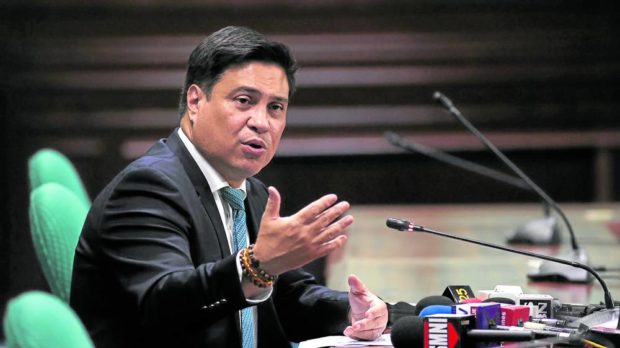MANILA, Philippines — Allies of President Ferdinand Marcos Jr. in the so-called supermajority in the Senate on Sunday urged Malacañang to immediately convene the Legislative-Executive Development Advisory Council (Ledac), noting that while the veto power is a right of the president, its frequent exercise could strain relations between the executive and legislative branches of government.
The suggestion followed Marcos’ decision to veto five measures approved by the previous Congress, including the tax exemption of the honoraria for teachers doing poll duties.
“We acknowledge that the veto power is a prerogative of the president, but it puts an unnecessary strain on the relationship between legislators and the executive,” Senate President Juan Miguel Zubiri told the Inquirer.
“This should be avoided,” he pointed out.
“We respect the prerogative of the president, but we also stand firm with conviction that we did our job,” Senate Majority Leader Joel Villanueva said.
Zubiri said he had already communicated with Executive Secretary Victor Rodriguez and Special Assistant to the President Anton Lagdameo Jr. regarding the need to hold a Ledac meeting as soon as possible.
Proactive liaison
The Senate leaders added that designating a proactive head of the Presidential Legislative Liaison Office (PLLO) would help the chief executive put into action the 19-point legislative agenda that he mentioned during his State of the Nation Address last week.
Villanueva underscored the critical role of the PLLO and Ledac in ensuring that the legislative work of Congress would be aligned with the Marcos administration’s priority measures.
For Sen. Juan Edgardo Angara, Senate finance committee chair, activating the Ledac would result in a “more harmonious relations between the legislature and the executive.”
“We need a proactive PLLO [secretary] who has the trust of both Malacañang and the two houses of Congress,” Angara said.
“I think the sooner the Ledac meets, the better,” added administration Sen. JV Ejercito.
The Senate President said he had also raised the importance of having a “good PLLO secretary who can easily communicate with both branches of government for a harmonious discussion and passage of bills.”
“Thankfully both (Rodriguez and Lagdameo) agreed to arrange [a] Ledac [meeting] soon and they have a shortlist for a PLLO secretary,” he said.
According to Zubiri, former Batangas representative and House secretary general Mark Llandro Mendoza emerged as the “favorite” nominee to lead the PLLO.
“Mendoza is a good choice as he has been a former legislator and is well known among the incumbent senators and members of Congress,” he said.
“With these two developments, I’m confident that the veto of future bills will be avoided,” he added.
5 vetoes so far
In his first 30 days in office, Mr. Marcos had already vetoed five measures approved by the previous 18th Congress.
The first was a bill that would have created the Bulacan Airport City Special Ecozone, which the President said would “significantly narrow our tax base” as it would provide special tax privileges to the proposed special economic zone.
He also rejected the measure expanding the franchise area of Aboitiz-owned Davao Light and Power Co., and another that sought to strengthen the Office of the Government Corporate Counsel.
Besides turning down the tax break for poll workers, the Chief Executive also blocked the creation of the Philippine Transportation Safety Board, a move that Sen. Grace Poe also described as “unfortunate.”
Senate Minority Leader Aquilino “Koko” Pimentel III said that while he understood the reasons that Mr. Marcos cited in thumbing down some of the measures, it was “unfortunate” that he chose to veto the bill that would have granted tax exemptions to election workers, many of them public school teachers.
Matched agenda
Pimentel explained that the tax break was actually intended as an incentive for members of the electoral boards for rendering services despite the dangers they face as election workers.
Established through Republic Act No. 7640, the 20-member Ledac was created in 1992 as a consultative and advisory body to the President—who also heads it—to discuss programs and harmonize the government’s national development plan with the legislative agenda of Congress.
The PLLO was created under Memorandum Order No. 128 dated Nov. 11, 1987, during the term of President Corazon C. Aquino. Under the administration of former President Fidel V. Ramos, the PLLO was strengthened, making it the agency under the Office of the President that will liaise with Congress regarding all matters impinging on executive-legislative relations. It was also tasked to officially orchestrate the formulation and the shepherding of the President’s legislative agenda and all other concerns of the executive department having to do with the legislature. INQ
